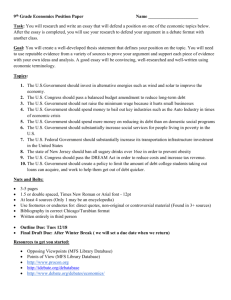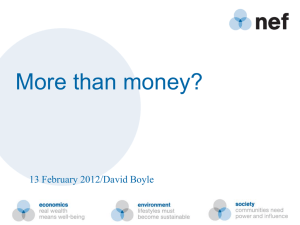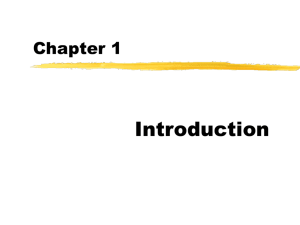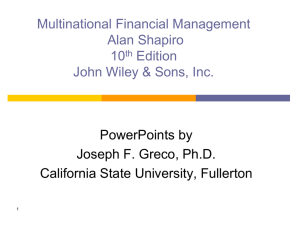Fixed Income & Money Markets Business
advertisement
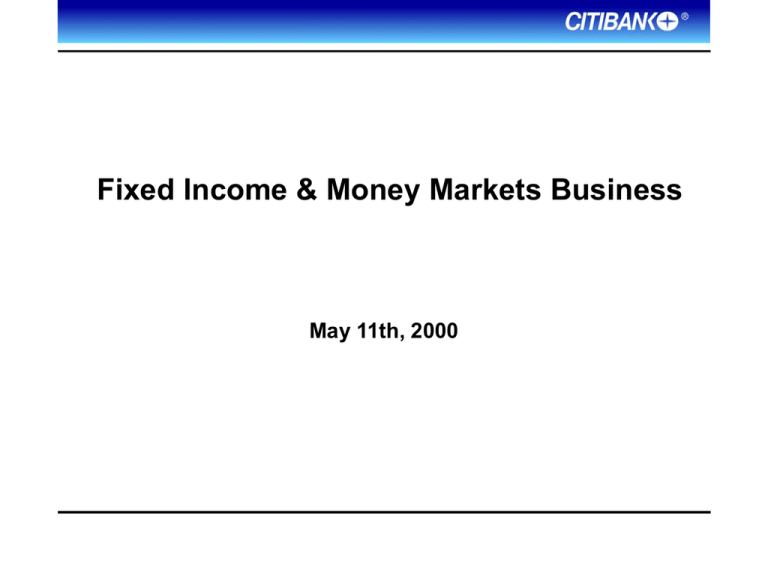
Fixed Income & Money Markets Business May 11th, 2000 Products Securities Funding & Gapping Government Bonds FX Re/$ Swaps Commercial Paper DFI Bonds and CDs Corporate bonds Interest Rate Derivatives Overview of the Money Markets Structure of Short-term rates Repo Rate Floating Rate Rate at which Central Bank drains liquidity Bank Rate 7% (Level I) Rate at which the Central Bank lends money to PDs / banks Reverse Repo Floating Rate (Liquidity Adjustment Facility) Daily Auction of Money where RBI injects money into the system at a variable rate determined on the basis of bids received from the market. RBI targets a corridor for overnight rates Increased reliance on Open Market Operations for monetary management Short term money markets (3-6mth) not developed Instruments, Yields and Market Size Instruments Call Present Yield 8.50% - 9.00% Size ( $ MM) Participants 3000 / day Banks / PDs. DFIs & MFs - only to lend Term (91 days) 10.00% - 10.50% 450 o/s Banks / PDs DFIs - borrow 3 months + Repo (14d) CPs (90d) CDs (3m) Tbills (3m) 9.25% - 9.75% 350 o/s 9.80% 1200 o/s All 1600 o/s Banks and DFIs 9.90% - 10.25% 9.25% Banks / PDs / DFIs / MFs Auction Calendar No restrictions 14-D, 3m, 6m, 1y Overview of the Debt Markets The Government is the Largest Issuer Debt Available for Trading on the National Stock Exchange ($ MMM) FIs/ Banks Corporate 7% 3% Tbills 4% State 8% GOI 69% PSU Bonds 9% Govt.. of India $ 69 MMM Public Sector Bonds $ 9 MMM State Governments $ 8 MMM T-bills $ 4 MMM DFIs/ Banks $ 7 MMM Corporate Bonds $ 3 MMM Total $ 100MMM Feb-2000 Trading on the National Stock Exchange The NSE is the primary exchange where corporate and government debt is traded Trading Share on the National Stock Exchange Primary Dealers 23.0% FIs / MFs 3.0% Indian Banks 41.0% Trading Members 16.0% Foreign Banks 17.0% Secondary Market Trading Volumes Debt Volumes on the National Stock Exchange 68 70 60 USD MMM 50 Increase in number and type of participants, along with falling interest rates, has led to increased trading volumes 40 28.5 30 20 10 12.1 2.2 23.9 3.5 0 1994-95 1995-96 1996-97 1997-98 1998-99 19992000 Est. Yield Curve - Government of India bonds 12.50% Tenor 12.00% 1 Goi Yields ( Jun-2000) 9.83 % 2 9.91 % 3 10.00 % 5 10.15 % 7 10.65 % 10.00% 10 11.08 % 9.50% 15 11.18 % 0.90% 11.50% 11.00% Mar-99 Jun-00 10.50% 9.00% 0 2 4 6 8 10 12 14 16 Yields have declined steadily driven by poor credit off-take, rate cuts and falling inflation Yield Curve - AAA Corporate Bonds 15.00% 14.00% 1.9% 13.00% 12.00% Mar-99 Jun-00 11.00% 10.00% 9.00% 1 2 3 5 7 10 AAA corporate yields have declined faster, driven by mutual fund demand and flight to quality New Developments New Developments . . . . . . . . . Interest Rate Derivatives Guidelines issued in July 1999 Currently, Notional Outstanding in IRS over USD 400 MM Overnight rates - are the only reliable benchmark for all swaps Limited inter-bank deals – ISDA documentation – Not represented fully by all foreign banks & Primary Dealers – Absence of nationalised banks – Other derivatives have not taken off IRD scope widened to include Mutual Funds New Developments . . . . . . . . . Mutual Fund Growth New Mutual Fund Policy – Dividends Tax free in the hands of the investor – Debt Fund to pay 20% tax on dividend distributed ( 0% for Equity) – Ability for investor to enhance post-tax return by Dividend stripping Impact – Compression of spread between GOI and corporate yield – Sharp increase in funds mobilised by MFs – Pressure on Banking spreads Net MF Investment Statutory Reserves (35% on deposits) 1997-98 $ 921 MM Differential Tax treatment 1998-99 $ 705 MM (30% on Interest income) 1999–00 $4900 MM Capital Adequacy Requirements ( 10 mths) ( 70% by Pvt. MFs) Total AUM of MFs USD 25 MMM ( UTI-73%, Public Sector –10%, Pvt Sector –17% ) Going forward - What is required Permission to short securities for increasing liquidity Develop the market for strips / When issued market in GOI securities Securitization market - Need for legal framework & investor awareness Corporate Debt Extension of repo market - participants & eligible securities Dematerialisation of corporate bonds Align stamp duty on all debt contracts to that applicable to Govt.. Securities Removal of withholding tax for FIIs on debt securities Development of retail interest in Corporate & Govt.. Debt DISCLAIMER Although the information contained herein is believed to be reliable, Citibank makes no representation as to the accuracy or completeness of any information contained herein or otherwise provided by Citibank. The ultimate decision to proceed with any transaction rests solely with the customer. Citibank N.A. is not acting as your advisor. Therefore, prior to entering into any proposed transaction, you should determine the economic risks and merits, as well as the legal, tax and accounting characterizations and consequences of the transaction, and that you are able to assume these RISKS. The contents of this presentation are proprietary in nature, and may not disseminated in whole or in part without Citibank's written consent.
